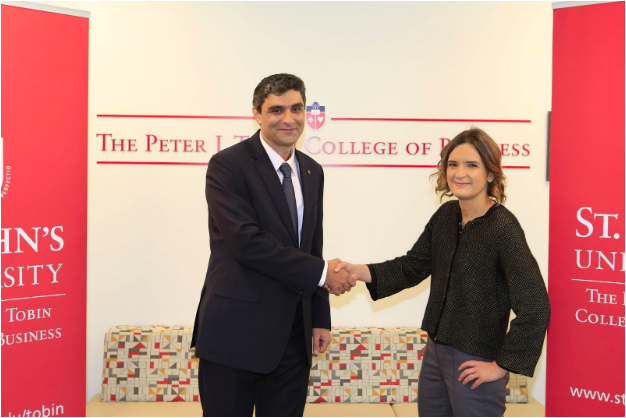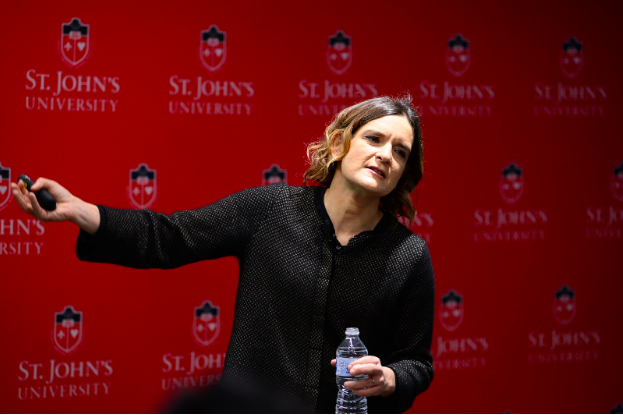“We can fight climate change.” This was just one of many insightful commentaries backed in economic rationale and delivered by Nobel Laureate and MIT Professor, Esther Duflo, PhD at St. John’s on Nov. 25. Dr. Duflo was the eleventh Nobel Laureate to visit the University for the Henry George Lecture Series —an event which garnered over 200 students, professors and administrators, along with 320 livestream viewers. Throughout the course of her lecture, tones of positivity and criticism remained prevalent as Duflo shared insight into the research published in her latest book co-authored with her partner, Ababhijit Banerjee, titled Good Economics for Hard Times. The book tackles today’s critical economic problems through detailed research on wide-ranging topics from immigraiton to automation, globalization, consumer tendencies and more.
It was with this new book in mind that Henry George Chair in Economics and Tobin Associate Professor, Aleksander V. Gevorkyan, invited Dr. Duflo to campus. Dr. Gevorkyan was ecstatic to learn that the chosen speaker had yet another award added to her list of accolades when it was announced earlier this month that Duflo had won the 2019 Sveriges Riksbank Prize in Economic Sciences in Memory of Alfred Nobel, alongside Ababhijit Banerjee, PhD and Micheal Kremer, PhD for their “experimental approach to alleviating global poverty.”
“We were very fortunate that Dr. Esther Duflo was able to visit us and share her interesting perspective on such a broad range of everyday issues that affect each of us. The presentation was truly in the spirit of Henry George’s teaching, as many of the problems raised by Dr. Duflo and policy solutions she discussed echoed the core concern raised by Henry George in building an inclusive, prosperous and modern society,” said Dr. Gevorkyan.
Student’s shared this grateful mindset. “Throughout her lecture, she was not afraid to debunk certain myths commonly circulated within the public policy realm, and instead, provided her own unique solutions on how to effectively address the issues most impactful to the working class based on empirical evidence,” said junior Economics and Government & Politics student, Sakib Mowla.
At 47, Duflo is the youngest person and second woman to win the high honor. She outspokenly attributed the lack of female winners in large part to the gender normative ways in which girls are raised to act politely rather than competitively. Duflo also noted that the underrepresentation of women and minorities in economics links back to the low percentage of these groups pursuing the field at the undergraduate level. Despite her many personal successes, Duflo herself claimed that “the interest rate and financial markets held absolutely no fascination” for her until she accidentally came to understand the potential for economics to drive improvements on a wide array of the world’s most pressing developmental and political problems.

“I wanted to work on poverty and progress with the hope that I could help people live their most promising and fulfilling lives,” said Duflo at the start of her speech. Duflo wrote her last book with Dr. Banarjee titled Poor Economics: A Radical Rethinking of the Way to Fight Global Poverty. Much like her work as co-founder and co-director of the Abdul Latif Jameel Poverty Action Lab at MIT, the book brought Duflo’s ideas to life through experimental research testing and on-the-ground interactions with the world’s poor. Poor Economics was widely acclaimed and is used in the course curriculum of the popular GLOBE micro-lending Business course in Tobin. Its theme of renewing dignity for the world’s poor is undoubtedly mirrored in our university’s Vincentian values.
Yet at the core of research is a general and significant distrust of economists, which Duflo pointed out in her lecture.
“The general distrust of economists that Dr. Duflo spoke of is something that will require time to change, but forward-thinking such as hers is what will shift people’s perspectives,” said sophomore Tobin student, Nupoor Wadekar.
For more information on Good Economics for Hard Times, or to view the live-stream visit:








